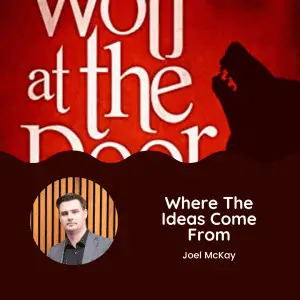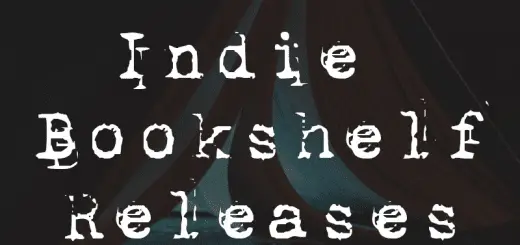Where The Ideas Come From
 “Where do you come up with this sh%t?”
“Where do you come up with this sh%t?”
That’s the question I’m asked – we’re all asked – more than any other. My brother. Parents. Friends. Readers. Co-workers. Strangely, not my wife (that’s how you know you’re with the right one).
I’ve seen writers get frustrated with it. I think it’s because they’ve been asked it so many times they just want to get onto the next part of the conversation, but it strikes me that for a reader – someone who appreciates the art – this really is the most obvious and perhaps interesting question.
While working as a freelance journalist, I used to get magazine assignments where I had to profile a tech company or CEO about their new-fangled creation. Some of the tech was pretty cool, most of it leading edge. Invariably I asked, where did you get the idea from?
As a business journalist, I interviewed hundreds of entrepreneurs and innovators, and that question was always part of the interview. Sometimes I already knew the answer and just wanted to hear them say it so I could quote it; other times, I didn’t. Regardless, I asked and then often printed the answer because it was interesting, and I knew my audience wanted to know the answer. I was asking the question for them.
The desire for people to understand one another, to communicate, to draw out the secret sauce that spurs creation and generates success is timeless. If you happen to meet a magician, I bet you’ll ask – or want to ask – how the trick works, even if you know the answer will ruin it for you. Same with a bridge engineer, or someone who builds power plants. Heck, even my contractor – I was floored with a solution he came up with for part of our roof replacement, and asked him, how did you come up with that?
It’s okay. It’s natural.
Now to the question itself: where do those ideas come from?
Everywhere. Everyday. From conversations, thing you see, experiences, knowledge, interactions, and yes, even dreams. Examples:
My forthcoming science fiction short story, The Ministry of Labour Transition (out via Bewildering Stories at the end of the year) was the answer to a frustration I had with end-of-the-world stories. I was bored with apocalyptic stories where Earth transformed into some desert-like hellscape full of pollution (i.e., Judge Dredd, Mad Max, etc.). I wondered whether the end might come about another way, through an engineered dismantling of the world. A conscious decision to transform it back to a wilderness. Why would that happen? How would it happen? What would it look like? Thus, was born the story of a mid-level civil servant in the dying days of British Columbia tasked with shutting down businesses so the city they were in could be reclaimed.
Or take my horror-comedy novella Wolf at the Door. First, I was really trying to teach myself how to write conflict, so I came up with the idea for a dinner party with a dozen or so characters who all had issues with one another. I wanted to see what would happen if I put them in a room together and added alcohol. Second, I was getting tired of the constant reinvention of monsters – I don’t feel we always need to give them a new look or reinterpret them. A werewolf is a werewolf, and I wanted a werewolf in the classic Universal Pictures sense. Third, I had this ridiculous idea – and still do – of mashing up genres with very little notice to the audience. Here’s what I mean, a story that starts as a rom-com, presents as a rom-com, plays as a rom-com (When Harry Met Sally) but three quarters the way through – with no warning – becomes a hardcore slasher (The Texas Chainsaw Massacre) and ends. Because I’m not very inventive, I just took these three ideas rolling around in my head and mashed them together like old bars of soap. And because I have trouble staying interested in anything for a long period, I made it a novella. You’re welcome.
The point is, often, the ideas come from questions that roll around in our heads or things that interest us. We then play with them, let them roll around in our heads, reform, and begin to create with them. The same way the ideas for FedEx and Facebook came to be, and the same way, I learned, my contractor figured out a solution to my leaky roof.
So, if you’re a reader, keep asking that question. It’s bloody interesting. And if you’re a writer, give it an answer – it’ll lead to interesting and inspiring places for you and your audience.
- About the Author
- Latest Posts
Joel McKay is an economic development professional, author and former public relations executive and journalist. He is based in Prince George, B.C. where he is the CEO of Northern Development, and sits on the boards of the University of Northern B.C. and Destination B.C.
Joel is passionate about British Columbia, especially its vast and relatively misunderstood north. His writing focuses on the people, places and issues relevant to northern and rural communities, typically with a healthy dose of the absurd or supernatural. His short story ‘Number Hunnerd’, a fish tale set in B.C.’s Cariboo, was published in Tyche Books anthology Water: Selkies, Sirens and Sea Monsters in 2021. His novella, Wolf at the Door, was published in the spring of 2022 and focuses on a disastrous family Thanksgiving dinner. His forthcoming fiction, a short western horror story titled ‘Hands’, will be published by Brigids Gate Press in the summer of 2022.
Joel was previously Director, Communications at Northern Development. During that time he led the creation and publication of the ‘Small Town PR Playbook’, a first-of-its-kind how-to book for rural public relations in Canada that won the Don Rennie Award from the Canadian Public Relations Society for excellence in government communications. Prior to that, he was Assignment Editor at Business in Vancouver Newspaper where his journalism earned him a Jack Webster Award for Business, Industry and Economics in 2011, and a nomination for a second Jack Webster Award for Multimedia Reporting in 2012.
He has received the Distinguished Alumni Award from Kwantlen Polytechnic University for his professional achievements, and in 2021 was awarded the Chairman’s Award from the B.C. Economic Development Association for his contributions to rural development. He has been named a Top 40 Under 40 by the Prince George Chamber of Commerce, and in 2021 and 2022 was named one of the 500 most influential business leaders in British Columbia by Business in Vancouver Media Group.













